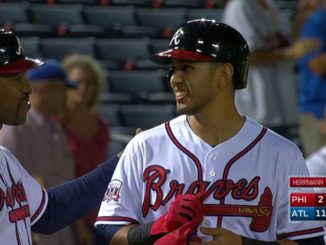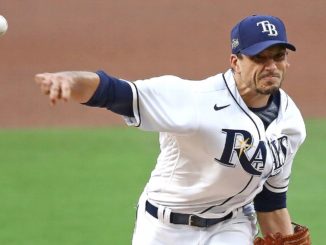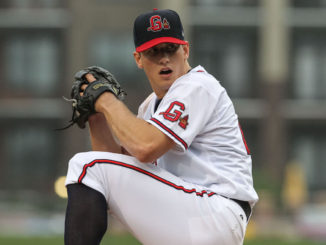“Everyone else is extending their young players, why can’t the Braves? Thanks, Liberty Media!”
It’s a common refrain heard by Braves fans. Many have resigned themselves to the notion that the young core of players are all bolting for greener pastures as soon as they get the chance, because Atlanta will never spend the money to keep them. Yesterday proved otherwise, as Freddie Freeman agreed to stay in Atlanta long-term via an 8 year, $135M contract, and Jason Heyward gave up his arbitration years for 2 years, $13.3M. Here are some quick thoughts on each deal.
Freeman
As you’ve no doubt read by now, Freeman’s is the largest contract the Braves have ever given out. It’s the 29th richest contracts ever awarded to an athlete, which is pretty impressive. Of the 28 ahead of him, all but 5 were MLB deals. Atlanta has managed to avoid the big, $100M+ deal for a long time, but as more money flows into MLB, it was inevitable that the Braves would ultimately succumb to a megadeal. The Braves are the 20th MLB to guarantee 9 digits of money to a single human being, joining the Yankees, Mariners, Angels, Reds, Dodgers, Rangers, Tigers, Twins, Red Sox, Rockies, Phillies, Mets, Cubs, Blue Jays, Giants, Nationals, Cardinals, Marlins (that’s right, the Marlins), and Astros.
Freeman doesn’t get a lot of love from fWAR, which badly underrates his defensive ability. He’s not the complete package defensively, as his lateral movement leaves a lot to be desired (specifically, we desire some lateral movement), but his glove skills are among the best in the game at the position. Baseball Prospectus’ WARP, on the other hand, had Freeman at 5.5 wins last year, which seems a more accurate approximation of his contributions. If the going rate on the open market for WAR is $7M per win, last season was worth $38M alone. Obviously he wouldn’t get that kind of money, but teams would certainly pay him to be a 3 or 4 win player if they could, and that’s what the Braves will be paying him to be once the post-arbitration part of this deal kicks into gear. Overall, the AAV comes out to $16.875M per year. To justify that on the WAR side of the ledger, he’ll need to contribute around 20 WAR over the next 8 years. It’s hard to imagine him failing in that regard. Freeman has the skill set to stay good. He makes hard contact, has good bat control, a good batting eye, etc. He has an excellent career line drive rate of 25%, and the power should improve, as he his ground ball rate has been under 40% in each of the last two seasons. As he fills out and adds bulk, his HR totals should improve. And if they improve, this becomes a bargain of a contract. If he remains a .300, 20-25 HR guy, it’s still worth it for both Freeman and the Braves.

Heyward
For two hours yesterday, Jason Heyward dominated the Braves news pipeline. Signing a little earlier than Freeman, the Braves inked Jason Heyward to a 2 year, $13.3M deal. It’s a significant win for the Braves’ file-and-trial arbitration philosophy. Players don’t want to go to arbitration hearings. Hearings aren’t always bad, and many players understand what’s happening and it has no effect on their relationship with the team. Sometimes, on the other hand, hearings can get nasty, feelings can get hurt, and relationships can be bruised. The Braves offered Jason Heyward $5.3M for 2014, and he filed for $5.6. Instead, because the Braves made their own leverage thanks to their strict adherence to their file-and-trial system, they’ll be paying him $4.5M. He’ll get $7.8M in 2015, but the point here remains – because the Braves make no exceptions, Heyward really had no room to expect one. And thus, if he wanted to avoid hearing about his injuries and down years in an arbitration hearing, he would have to sign away his 2015 arbitration hearing as well. Heyward has been a 3 or more win player in 3 of his 4 seasons in the bigs, and at age 24 for the 2014 season, a big step forward is not out of the question. Atlanta’s negotiating power just got a potential MVP candidate to sign for a million less than he would be guaranteed if he’d gone to arbitration, and got his final year of arbitration for a very reasonable number. If Heyward has another 6 win season, the 2015 arb total would have been somewhere in the ballpark of $10M or higher. In short, the Braves won this negotiation, no two ways about it.




Leave a Reply